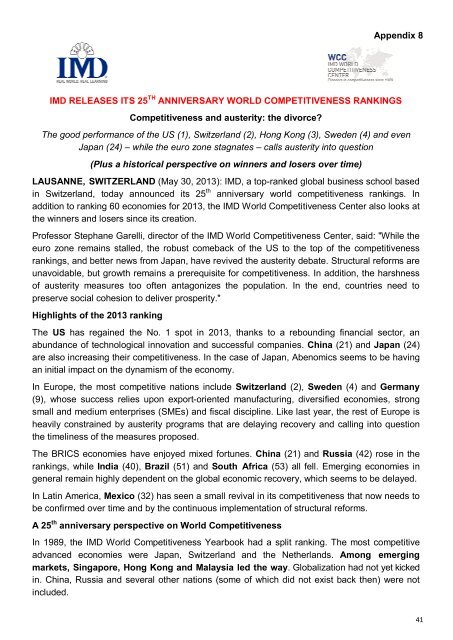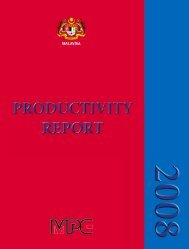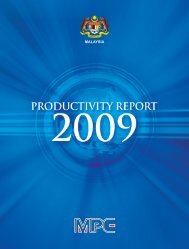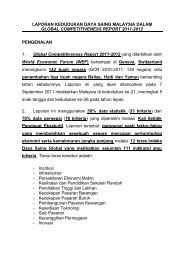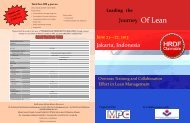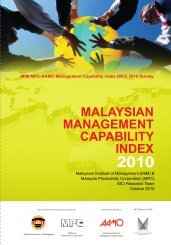Booklet WCY 29 Mei 2013 1 - MPC
Booklet WCY 29 Mei 2013 1 - MPC
Booklet WCY 29 Mei 2013 1 - MPC
You also want an ePaper? Increase the reach of your titles
YUMPU automatically turns print PDFs into web optimized ePapers that Google loves.
Appendix 8<br />
IMD RELEASES ITS 25 TH ANNIVERSARY WORLD COMPETITIVENESS RANKINGS<br />
Competitiveness and austerity: the divorce?<br />
The good performance of the US (1), Switzerland (2), Hong Kong (3), Sweden (4) and even<br />
Japan (24) – while the euro zone stagnates – calls austerity into question<br />
(Plus a historical perspective on winners and losers over time)<br />
LAUSANNE, SWITZERLAND (May 30, <strong>2013</strong>): IMD, a top-ranked global business school based<br />
in Switzerland, today announced its 25 th anniversary world competitiveness rankings. In<br />
addition to ranking 60 economies for <strong>2013</strong>, the IMD World Competitiveness Center also looks at<br />
the winners and losers since its creation.<br />
Professor Stephane Garelli, director of the IMD World Competitiveness Center, said: "While the<br />
euro zone remains stalled, the robust comeback of the US to the top of the competitiveness<br />
rankings, and better news from Japan, have revived the austerity debate. Structural reforms are<br />
unavoidable, but growth remains a prerequisite for competitiveness. In addition, the harshness<br />
of austerity measures too often antagonizes the population. In the end, countries need to<br />
preserve social cohesion to deliver prosperity."<br />
Highlights of the <strong>2013</strong> ranking<br />
The US has regained the No. 1 spot in <strong>2013</strong>, thanks to a rebounding financial sector, an<br />
abundance of technological innovation and successful companies. China (21) and Japan (24)<br />
are also increasing their competitiveness. In the case of Japan, Abenomics seems to be having<br />
an initial impact on the dynamism of the economy.<br />
In Europe, the most competitive nations include Switzerland (2), Sweden (4) and Germany<br />
(9), whose success relies upon export-oriented manufacturing, diversified economies, strong<br />
small and medium enterprises (SMEs) and fiscal discipline. Like last year, the rest of Europe is<br />
heavily constrained by austerity programs that are delaying recovery and calling into question<br />
the timeliness of the measures proposed.<br />
The BRICS economies have enjoyed mixed fortunes. China (21) and Russia (42) rose in the<br />
rankings, while India (40), Brazil (51) and South Africa (53) all fell. Emerging economies in<br />
general remain highly dependent on the global economic recovery, which seems to be delayed.<br />
In Latin America, Mexico (32) has seen a small revival in its competitiveness that now needs to<br />
be confirmed over time and by the continuous implementation of structural reforms.<br />
A 25 th anniversary perspective on World Competitiveness<br />
In 1989, the IMD World Competitiveness Yearbook had a split ranking. The most competitive<br />
advanced economies were Japan, Switzerland and the Netherlands. Among emerging<br />
markets, Singapore, Hong Kong and Malaysia led the way. Globalization had not yet kicked<br />
in. China, Russia and several other nations (some of which did not exist back then) were not<br />
included.<br />
41


